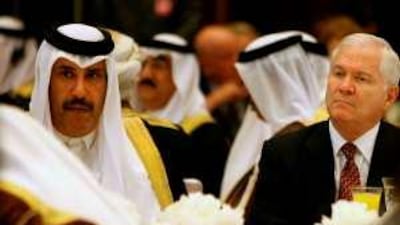MANAMA // The International Institute for Strategic Studies (IISS) will hold a geo-economic summit in Bahrain next week and mark the occasion by opening an office in the country, its first in the Middle East.
The moves by the London-based think tank, which is one of the most respected in the world, appear to be a sign of its intent to play a bigger role in the interaction between regional states, the Middle East and the West. The summit, titled The Bahrain Global Forum: Rebalancing Global Geo-economic Strategies for Security, Growth and Development, will bring together key economic and political players from around the world to exchange views in an informal manner on global economic relations and trends.
The IISS already jointly holds an annual regional security summit with Bahrain's foreign ministry known as the Manama Dialogue. It is the success of that event that the institute is hoping to build on when launching The Bahrain Global Forum, according to the executive director of the IISS's US and Middle East department, Andrew Parasiliti. "The IISS Bahrain Global Forum is the first geo-economic strategy summit of its kind. Its purpose is to examine the relationships between the international economy and global security," Mr Parasiliti said.
"The forum will assist the development of sound public policies and strategies for security, growth and development." Top economic and political leaders are expected to address and attend the three-day summit, which does not neglect the fact that Asia - particularly India and China - is central to any future shift in balance of powers between East and West, and this topic will be a key feature of the event.
Montek Singh Ahluwalia, the deputy chairman of India's planning commission, a governmental economic body, will deliver the opening address. Among the 300 policy makers attending the two-day event, which begins on May 14, will be the prime ministers of Jordan and Kurdistan, the deputy prime ministers of Qatar and Syria, and Sweden's foreign minister. The IISS director of transnational threats and political risk, Nigel Inkster, said the future of global financial and economic governance and the challenge of maintaining acceptable levels of growth, particularly in the developing world, was likely to be at the heart of the conference.
"The Bahrain Global Forum takes place at a time when the global financial system is still recovering from the 2008 crisis. Some parts of the world have weathered that crisis well but there is a widespread sense that without reform a further crisis is likely in the future," Mr Inkster said. "As things stand, those in the financial world disposed to take excessive risk have every incentive to continue doing so in the conviction that governments will again bail them out should they make mistakes. Emerging powers see the crisis as an opportunity for them to take a greater part in global financial decision-making mechanisms and changes in IMF voting rights have to some degree acknowledged these aspirations."
Mr Inkster pointed to the growing role China plays in the region, saying its attitude was characterised by two things: first, an ideological desire to diminish the global dominance of the US and promote a "multi-polar world"; and second, "a nationalist focus on the accumulation of capital and a zero-sum approach to competition for resources". The IISS will open its new office in Manama, which will serve as the institute's regional headquarters, the day before the summit begins. The managing director of the new office, Mark Allworthy, said: "The office will focus on the traditional areas of strength of the IISS and will maintain therefore a strong perspective on security and international relations. However, we will also begin to explore the relationships between security and the economy as we build a significant geo-economics agenda.
"Furthermore, in its role as a hub for IISS activity, the office will host meetings organised outside the framework of its own regional operations and will therefore act as a meeting place for senior governmental officials, business leaders, and global experts to discuss the whole range of issues tackled by the IISS." An IISS spokesman, Kathryn Floyd, said that the office would serve as a hub for the IISS, connecting operations and research programmes from the headquarters in London and the regional offices in Washington DC and Singapore.
She said: "As IISS-Middle East grows, we will engage a staff of experts who will produce the best available analysis on regional trends and broader strategic issues, as well as build our relationships with governments and strategically minded businesses." In December this year, the IISS and Bahrain's foreign ministry will hold their seventh annual Manama Dialogue. The two have an agreement to hold the summit every year until 2011.
The security summit was started in 2004 at the height of tensions between the Middle East and western powers over the invasions of Afghanistan and Iraq, and Iran's controversial nuclear programme. @Email:mmahdi@thenational.ae

